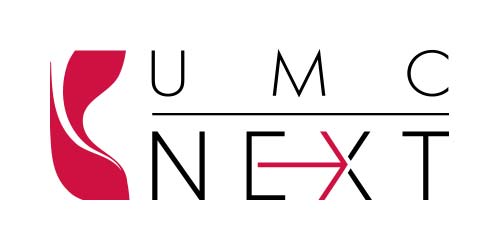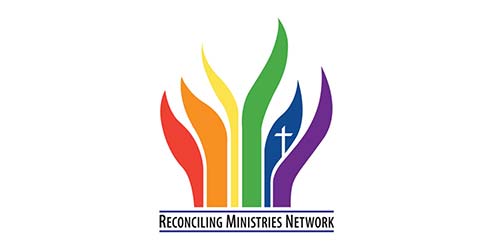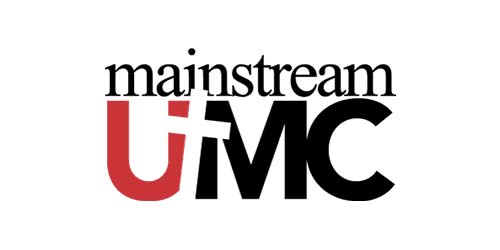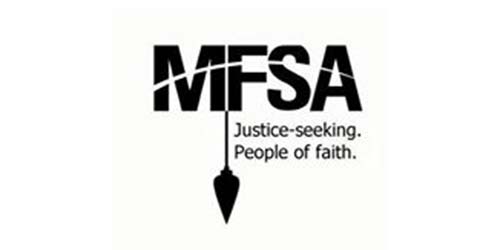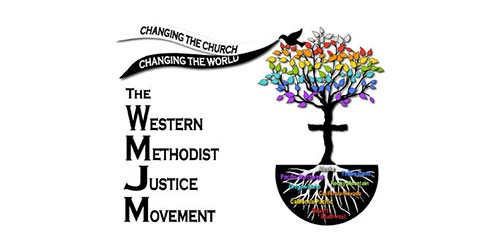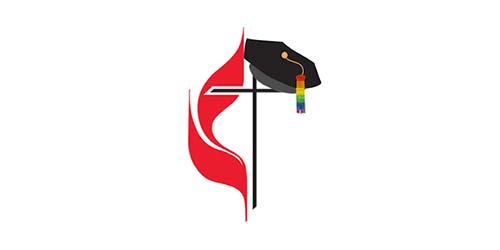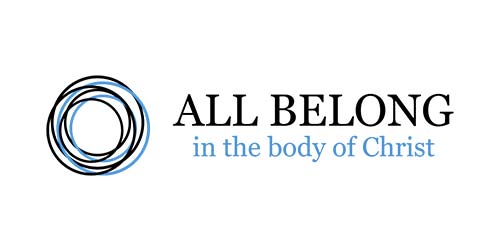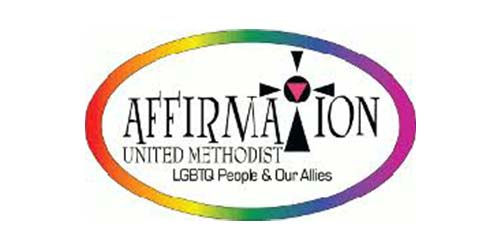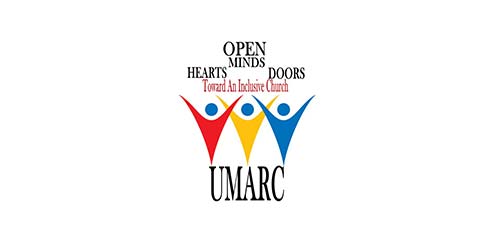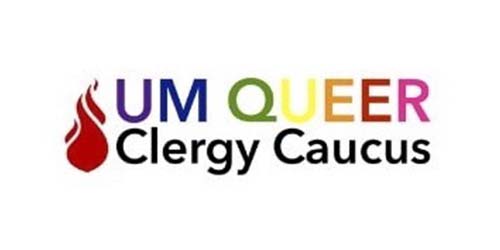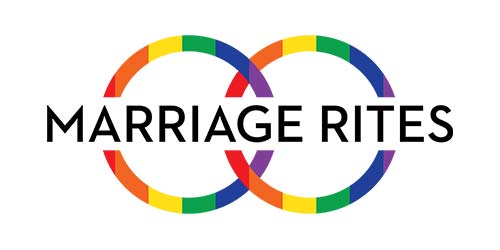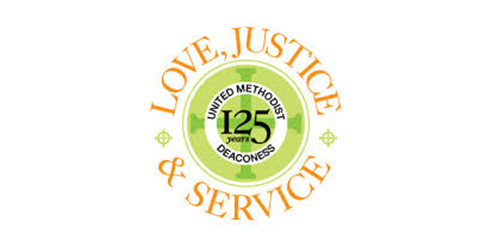Clergy Support
Although The UMC Book of Discipline holds that “homosexual persons no less than heterosexual persons are individuals of sacred worth,” the Book of Discipline negates this truth, considering the “practice of homosexuality incompatible with Christian teaching.” It also states that “The United Methodist Church does not condone the practice of homosexuality” or allow “self-avowed practicing homosexuals” to be “certified as candidates, ordained as ministers, or appointed to serve in The United Methodist Church” and it prohibits the blessing of same-sex unions by its clergy and in its churches.
Do You Need Help?
We have assembled a group of clergy and laity willing to provide advice and support to those who may have charges brought against them.
If you are a clergy person and you anticipate the potential for a formal complaint being filed against you, or if you have already received notice of a formal complaint, please complete this confidential form and one of our clergy support coaches will contact you within 24 hours.
How to Support Our Clergy
One way to help is to agree to be on Committees of Investigation for your conference or jurisdiction or a jury of your peers, if asked. Resistance to unjust prohibitions in the Book of Discipline from these seats is "upholding the Discipline of the UMC.”
In addition to private support, direct action or demonstrations at the sites where people are being harmed are occurring and can be helpful. Sign up if you want to be notified of one in your conference.
Under Formal Complaint
Currently, two clergy are known to be in some stage of the complaint process. Both of these individuals are gifted, effective clergy who have taken seriously their baptismal vows and their call to local ministry. The only reason for the complaint was because the person agreed to marry a same sex couple. Those who filed complaints against these clergy did so only on the grounds of our denomination’s anti-LGBTQ discrimination.
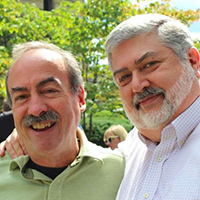
Rev. David Meredith
West Ohio Annual Conference, 2017
After marrying his partner in 2016, three charges were filed against Meredith. Two charges were completely dismissed and a third, “disobedience to the Order and Discipline of The United Methodist Church” was retained but partially revised. Following a review by the North Central Jurisdictional Committee on Appeals, a ruling cited that by dismissing and revising Church law in the charges filed against Meredith, significant errors had been made by the Conference’s Investigative Committee such that the case was referred back to the West Ohio Conference for more thorough evaluation. Meredith currently serves as the Lead Pastor of Clifton UMC in Cincinnati and is the Director of Urban Ministry in the Ohio River Valley District.
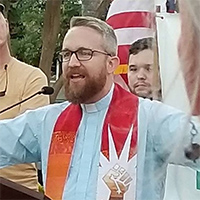
Rev. Andy Oliver
Florida Annual Conference, 2019
Oliver officiated a same-sex wedding in March 2019, and a complaint was filed against him. He is currently in the required preliminary legal process of seeking a “just resolution” with his complainant and bishop, but depending on the final outcome of the judicial process, Oliver still faces the possibility of a trial and the loss of his clergy credentials.
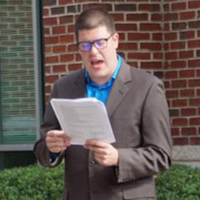
Rev. Drew Ensz
Virginia Annual Conference, 2019
Ensz has had two complaints filed against him for officiating a same-sex wedding ceremony. Ensz had confirmed and served as a youth minister to one of the partners in the wedding. These complaints lead Ensz, his bishop, and the complainant into the United Methodist judicial process that may ultimately lead to a church trial and the loss of Ensz’s clergy credentials.
More Harm Ahead
The legislation passed in the Special General Conference in 2019 has made the complaint process even more cruel and punitive by removing elements of due process and by legislating mandatory minimum penalties for conducting a same-sex wedding. Performing a same-sex wedding is the only “chargeable offense” in the Book of Discipline with mandatory penalties.
Who will be next?
The threat of complaints and having a complaint file against you is a great source of fear and harm. In addition, thanks to the Traditional Plan that was passed, the complainant now has more opportunities to inflict harm throughout the complaint process. The Traditional Plan makes it possible for complainants to undermine any chance for a “just resolution” by making trials more likely, costly and painful.
Every complaint that goes to trial costs the denomination a minimum of $50,000. Those dollars would normally go to ministry. The victim, the targeted clergy, will also have to pay thousands of dollars personally for legal fees, travel and other out-of-pocket costs. This is in addition to penalties incurred such as loss of income, health insurance, housing, and other financial benefits.
A History of Harm
Officiating at a same-gender wedding or coming out as openly LGBTQ clergy remain chargeable offenses under the current Book of Discipline. Over the years, formal complaints have been filed and clergy have undergone church trials - some of which have resulted in clergy being defrocked. Additionally, effective and faithful LGBTQ clergy and their clergy allies have been forced to live in fear of punishment if they elect to live out their pastoral calling. Below are a few examples of clergy who have faced complaints over the past decades.
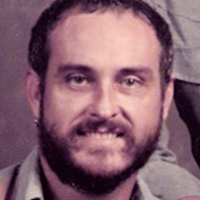
Rev. Gene Leggett
Southwest Texas Annual Conference, 1971
In 1971 Leggett came out to his friends and family. After doing so, he was outed to The Board of Ordained Ministry and bishop. Because of Leggett’s sexual orientation, the bishop and Board told Leggett that he was “unacceptable in the work of ministry.” This was followed by an annual conference clergy vote that called for Leggett to be suspended from ministry and to surrender his clergy credentials because he was “unacceptable” as United Methodist clergy.
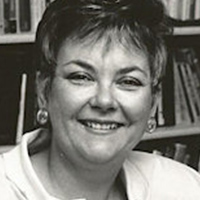
Rev. Dr. Rose Mary Denman
New Hampshire Annual Conference, 1987
Denman came out to her bishop in 1986 followed by her request to transfer her ministerial credentials to the United Universalist Association. However, the transfer process took longer than Denman’s bishop was willing to support, and it was suggested that Denman surrender her credentials and take a voluntary termination as a “self-avowed, practicing homosexual.” Denman refused to do so and faced a church trial resulting in a jury decision to not immediately terminate her ministerial credentials but to give Denman time for her UUA transfer to be completed.
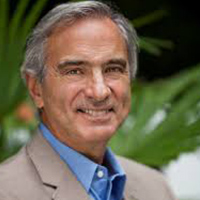
Rev. Jimmy Creech
Nebraska Annual Conference, 1997, 1999
In September 1997, Creech officiated a covenant service for two women and subsequently faced charges for doing so by the Nebraska Annual Conference. As the confidential resolution process began, Creech was suspended for 60 days with pay. This suspension was extended until the process was complete, at which time the Conference referred the case for trial. At the end of the trial, Creech was acquitted and returned to his appointment. In 1999, Creech co-officiated a holy union service for two men, and once again a complaint was made. The complaint was referred for judicial process, which led to charges that Creech was disobedient to the Order and Discipline of The United Methodist Church. At the conclusion of this second trial, Creech’s clergy credentials were removed.
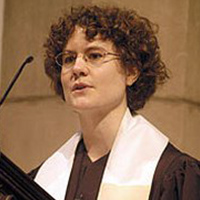
Rev. Beth Stroud
Eastern Pennsylvania Annual Conference, 2004
In 2003, Stroud informed her congregation that she was in a relationship with a woman, her then-partner, and although her congregation supported her, the Eastern Pennsylvania Annual Conference acted upon the charges brought against her. In 2004, the trial process began, accusing Stroud of “practices declared by The United Methodist Church to be incompatible with Christian teaching.” The trial resulted in the loss of her clergy credentials. At one point an appeal overturned the verdict, but in 2005 the Judicial Council of The United Methodist Church reinstated the original verdict to remove Stroud’s credentials.
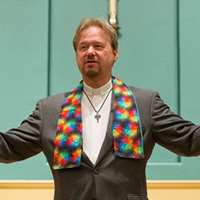
Rev. Frank Schaefer
Eastern Pennsylvania Annual Conference, 2013
Complaints were filed against Schaefer for officiating the marriage of his gay son in 2007. According to United Methodist policy, he was found guilty of violating Church law that prohibits clergy from officiating same-sex weddings and of violating the Church’s discipline and order. After a 30-day suspension, Schaefer was told he could either follow Church law or voluntarily surrender his clergy credentials. Schaefer stated that he would not voluntarily give up his credentials but would file an appeal. The Northeastern Jurisdictional Committee of Appeals restored Schaefer’s clergy credentials and ordered that Schaefer be compensated for lost salary and benefits. The bishop of the Eastern Pennsylvania Conference stated she would reinstate Schaefer to ministry, but Schaefer was also invited to transfer to the California-Pacific Annual Conference and he opted to do so.
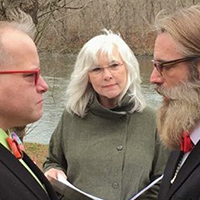
Rev. Dr. Pam Hawkins
Tennessee Annual Conference, 2015
Hawkins, active for several years in Reconciling Ministries Network, was asked by a same-sex couple in her appointed congregation to officiate their wedding. The couple had been leaders in the church – serving as youth counselors, choir members, and Bible study leaders as well as rearing their four children in the congregation. Self-reporting to her district superintendent and bishop, Hawkins was charged for having officiated the marriage ceremony but was overwhelmingly supported by the church she served. After a lengthy, difficult “just resolution” process, Hawkins was suspended from ministry for 90 days without pay.
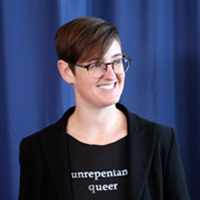
Rev. Anna Blaedel
Iowa Annual Conference, 2019
After enduring two complaints from within Iowa, Blaedel had a third complaint filed against them by the Institute for Religion and Democracy's employee John Lomperis. Blaedel was charged by the Iowa Conference Committee on Investigation of violating United Methodist policy. Blaedel has recently agreed by resolution to take an indefinite leave of absence. They will retain their clergy credentials during this time but are discerning a livable future outside The UMC after the harm of repeated complaints has made ministry unsustainable.
But sadly, these clergy are not the only ones. Below are additional clergy who have faced complaints and/or been put on trial for officiating same-sex weddings or for identifying as lesbian, gay, bisexual, or transgender. Other clergy whose names belong on this list have chosen to remain private. Many more have surrendered their orders under threats and intimidation by the Church, and even more were forced out of the ordination process or away from their calling to ministry before they even had a chance to be ordained.
- Rev. Paul Abels, 1979
- Rev. Greg Dell, 1998
- John J. Auer, III, 2000
- Brandon Austin
- Donald L. Baldwin
- Claire Beals-Nesmith
- Robert W. Blaney
- Diana Marie Bohn
- Richard E. Bruner
- Carol M. Carter
- George Carter
- Jerry Carter
- John Chamberlain
- Thomas Clark
- Clifford Crummey
- Donna Morrow DeCamp
- Sharon Delgado
- Nadine DeWitt
- Steven Eatough-Smith
- Janet S. Everhart
- Renae Extrum-Fernandez
- Donald Fado
- David Franks
- Glenn Fuller
- Nobuaki Hanoaka
- J. Richard Hart
- Robert J. Hawthorne
- Douglas Hayward
- Thomas Hicks
- Bruce Hilton
- Virginia Hilton
- Elbert Hoffman
- Hubert L. Ivey
- Alan H. Jones
- Linda Kelly
- Philip Lawson
- Stephen Lee
- Charles Lerrigo
- James Lockwood-Stewart
- David MacMurdo
- Theresa Mason
- Victor W. McLane
- Maggie McNaught
- Douglas Monroe
- Bob Moon
- Mike Morizono
- Mary Parker-Eves
- Larry Patten
- Ted Pecot
- Cheri Pierre
- Jay Pierce
- Kathleen Ralston
- Robert Rankin
- Lynn Rhodes
- Byron Roberts
- Ellen Rowan
- Robert Sanford
- Doug Smith
- Marlene Spilman
- Judith Stone
- Frank H. Stone
- Gerald Summers
- Paul Sweet
- Margo Tenold
- Harold A. Tillinghast
- Richard Whitmore
- Cecil Williams
- Lee Williamson
- Andrea Meek Winchester
- Sargent Wright
- Rev. Mark Williams, 2001
- Rev. Rebecca Steen, 2002
- Rev. Karen Dammann, 2004
- Rev. Drew Phoenix, 2007
- Rev. Amy Delong, 2011
- Rev. Dr. Thomas Ogletree, 2013
- Rev. Cheryl A. Fear
- Rev. Steve Heiss
- Rev. Gordon Hutchins
- The Philadelphia 33
- Rev. Sarah Thompson-Tweedy
- Rev. Bill McElvaney, 2014
- Rev. Ed Rowe
- Rev. Mike Tupper
- Bishop Melvin Talbert
- Rev. Amanda Garber
- Rev. Dr. John Copenhaver
- Rev. Larry W. Sonner, 2015
